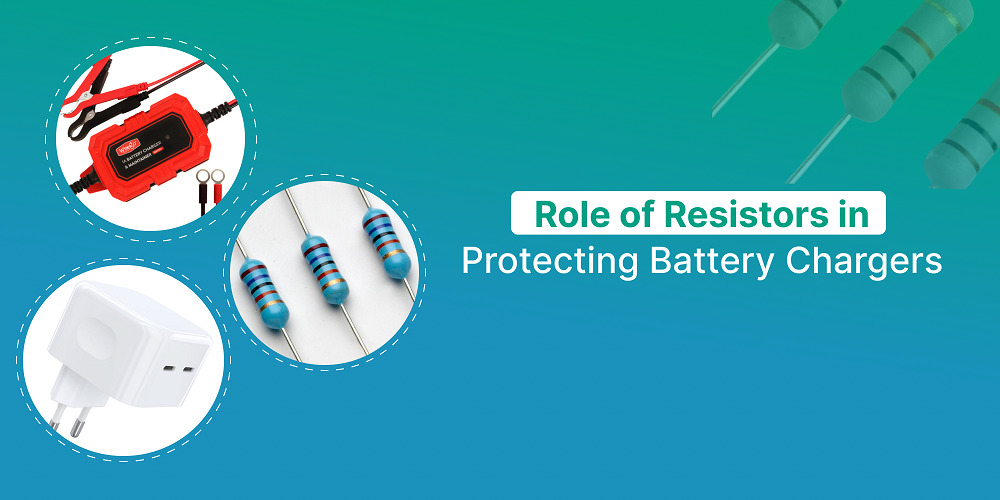
Role of Resistors in Protecting Battery Chargers
Battery chargers work hard behind the scenes to keep our phones, tools, vehicles and power banks ready. Safety and reliability are not only about the ICs and transformers. The humble resistor is often the first line of defence that protects the charger, the battery and the user. If you are choosing a Resistor For Battery Chargers or reviewing a design that uses one, it helps to understand where and why resistors matter.
Why resistors are essential in chargers
- Current limiting and inrush control
At power-up a charger can see a sudden rush of current. A well chosen series resistor limits this surge and prevents stress on diodes, MOSFETs and the transformer. It also protects the input fuse and helps the charger meet safety margins during transients. - Voltage sensing and feedback
Resistor dividers scale battery and output voltages so that the controller can read them accurately. Stable, precision resistors keep regulation tight across temperature and time, which improves battery health. - Balancing and equalisation
In multi-cell packs, resistors help balance cells by bleeding small currents. This avoids over-charge on stronger cells and extends pack life. - Snubbers and EMI damping
Resistors paired with capacitors form RC snubbers that tame switching spikes. This improves efficiency, reduces noise and protects semiconductors. - Soft start and timing
Resistors set safe ramp-up profiles and control timing in simple chargers, helping avoid stress when a deeply discharged battery is connected. - Bleeder and discharge paths
Across large capacitors, resistors provide a safe discharge path after unplugging the charger, improving user safety during service.
These roles appear across charger categories such as Simple, Fast, Smart, Trickle, Pulse, Solar, Induction or Wireless, USB-based, Three-stage, Multi-port, Car and Power Bank chargers. The exact resistor requirement changes with topology and environment, but the protection goals remain the same.
Picking the right Resistor used in Battery Chargers
Two proven families meet most needs in charger design and maintenance:
Metal Film Resistors CMR and CMMR series
For precision sensing, feedback networks and signal paths, Metal Film is often the best choice. The CMR and CMMR series from our line offer tight tolerance options and excellent stability. Benefits include:
- Accurate voltage sensing that keeps charge termination points correct
- Low noise for clean feedback in high frequency switchers
- Predictable temperature behaviour that keeps calibration intact over seasons
- Good long-term drift performance which supports service intervals and warranty goals
Use CMR or CMMR in feedback dividers, current sense amplifiers, reference setting, control loops and battery fuel gauge interfaces. In smart, three-stage and USB-based chargers, these resistors help the controller make the right decision at the right time.
Metal Oxide Resistors CSN and CMSN series
When the job demands higher pulse energy and heat endurance, Metal Oxide stands out. The CSN and CMSN series provide strong overload and surge handling with flame-retardant construction. That makes them ideal for protection roles:
- Inrush limiting on AC input and DC lines
- RC snubbers and dampers around switching nodes
- Bleeder paths across bulk capacitors
- Cell balancing where continuous small dissipation is expected
Choose CSN or CMSN where robustness, safety and pulse capability are key. They suit car chargers that face automotive transients, solar chargers that see day-night swings and pulse or induction chargers that operate with higher peak stress.
Mapping resistor choice to charger types
- Simple and Trickle chargers
Use CSN or CMSN for input limiting and bleeders. Use CMR or CMMR where you need stable voltage division. - Fast and Smart chargers
Feedback accuracy matters more. Prefer CMR or CMMR in dividers and current sense paths. Keep CSN or CMSN for snubbers and surge damping. - Pulse chargers
The switching network benefits from Metal Oxide damping. Pair CMSN with quality capacitors to control ringing, while CMR handles measurement rails. - Solar chargers
Ambient heat and wide input range call for robust parts. Use CSN or CMSN for input protection and soft start. Keep CMR or CMMR for MPPT sensing accuracy. - Induction or Wireless chargers
High frequency sections need stable, low noise resistors in feedback. CMR or CMMR fit well. Use CSN or CMSN where coils and rectifiers can cause spikes. - USB-based, Three-stage and Multi-port chargers
Port negotiation and multi-channel control rely on precise sense networks. CMR or CMMR provide the consistency you need across ports. - Car chargers and Power banks
Expect vibration, transients and heat. CSN or CMSN help with protection. CMR or CMMR keep fuel gauge and termination points accurate.
Quick selection checklist
- Function
Measurement and control use Metal Film CMR or CMMR. Protection and damping use Metal Oxide CSN or CMSN. - Power and pulse
Check continuous wattage and pulse profile. For inrush and snubbers, pick CSN or CMSN with margin. - Tolerance and stability
For cut-off thresholds and charging profiles, select tight tolerance CMR or CMMR to avoid early or late termination. - Temperature and safety
Consider enclosure heat, airflow and flame resistance. Metal Oxide helps where heat and safety are priorities. - Size and layout
Ensure spacing near hot parts and high voltage nodes. Keep sense resistors away from switching noise where possible.
Why Cermet Resistronics
Choosing the right resistor is not just a technical detail; it is a matter of safety and reliability. A poor-quality resistor can lead to charger failure, battery damage, or even fire hazards. This is where Cermet Resistronics comes in. As a leading authorised distributor, Cermet Resistronics provides high-quality resistors, including the CMR & CMMR series of metal film resistors and the CSN & CMSN series of metal oxide resistors. When you choose a resistor for battery chargers from a trusted source like Cermet Resistronics, you are investing in the safety and longevity of your electronic devices. In conclusion, the next time you plug in your device to charge, take a moment to appreciate the tiny resistor inside the charger. It is the unsung hero that ensures your battery gets the right amount of power, protecting it from damage and keeping you connected.

